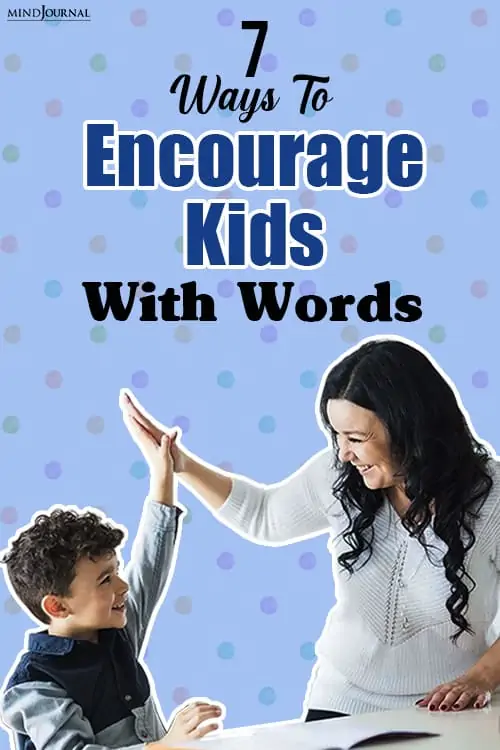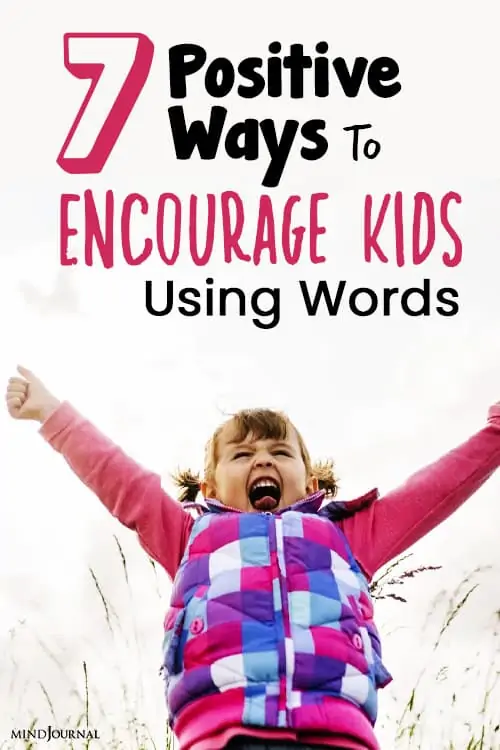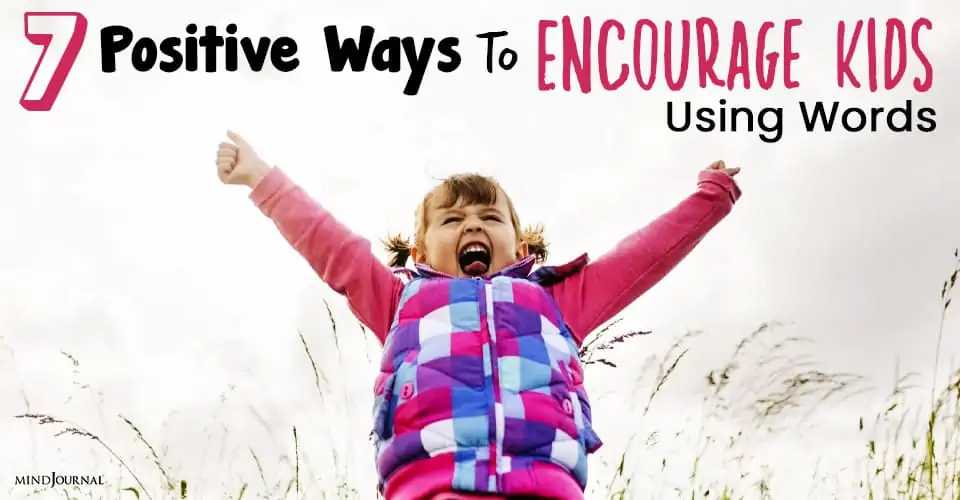Encouraging kids whenever they do something nice or achieve something is an essential part of childhood. However, coming up with different ways to encourage kids with words is quite challenging. This will ultimately have a significant positive impact on their lives. It is important to be careful and attentive with words when you are dealing with your kids.
Parents and teachers usually adopt different ways to encourage kids with words. Positive reinforcement can greatly condition a child to deal with future challenges. This can be done with consistent positive affirmations and appreciation. Whether it’s in the case of academic performance or achievements in other fields, some of the common encouraging words that are used are “good job”, “well done” or “you’re amazing”.
However, it is important to note that using encouraging words doesn’t always motivate kids. As a matter of fact, it can be counterproductive. The effectiveness of using positive words depends on the way it is used.
There are usually three benefits of using the right words of encouragement. They include:
- Using encouraging words can improve a child’s self-esteem. A 1990 study reported that using positive words for kids with low esteem can be extremely beneficial for the child’s emotional and mental development.
- Positive encouragement can increase a child’s intrinsic motivation. Using intrinsic motivation in academics can influence a child’s desire to learn.
7 Positive Ways To Encourage Kids Using Words
1. Praise Sincerely and Spontaneously
Parents often praise their children to boost their confidence even if they haven’t achieved anything noteworthy. They also encourage them to be good. It is important to understand that if encouraging words are not perceived as sincere and honest, they won’t feel as encouraged as they should be. Insincere praises are ineffective and can negatively impact the emotional health of the child.
Insincere encouragement can result in the child thinking that the praise is inconsistent with their behavior. For instance, when the parent praises even though the child didn’t perform well, the child thinks “that’s not true. I didn’t perform at all”. This can lead to self-criticism and make them self-destructive.
Overly general encouragement may also be perceived as insincere since any general praise is more likely to be inconsistent with the existing facts. For instance, if you are praising your child for doing well in school even if they haven’t, they may think to themselves “I’m not an angel. I am not doing so well in school”. Hence spontaneous praising can go a long way in encouraging their good gestures and behaviors. Using praise to manipulate their behavior is also perceived to be insincere.
Related: Top 10 Worst Parenting Words You Should Never Use for Your Child
2. Don’t Use Conditional and Controlling praise
Controlling praises are used with the intention of controlling or manipulating. It is a technique that is used to affirm a child’s progress, improvement, and task. For instance, telling your child a statement such as “good! But I think you can do better” is usually intended to motivate the child to try harder next time.
In the case of using encouragement as a controlling tool, children can receive the proper approval and positive evaluation that helps to develop self-worth. Conditional encouragements develop contingent self-worth in kids. Self-worth is an aspect that kids tend to develop even when they are as young as two years.
These kids grow up to believe that their self-worth is directly linked to validation and approval. Hence their goals are mostly validation-oriented. Some parents believe that this may be right and this is the method to adopt. It is also worth mentioning that this child may even avoid activities that may cause negative judgment.
Kids whose self-worth is based on others’ approval will not want to try new things because they think that this may not lead to a good outcome. These kids are often less creative since new ideas may interfere with their prevalent beliefs of validation. Hence it is crucial to understand the different ways to encourage kids with words to use them efficiently.
For instance, if the child performed well academically, it is not advisable for the parent to say “you did very well just as expected.” Instead, they can say “you did very well on that one”.
3. Use Illustrated Comments
When a parent points out a specific aspect of the child’s performance and focuses on their behavior that led to their brilliant performance, they immediately get encouraged to keep doing good deeds. An important aspect of encouraging kids is to praise them using descriptive, illustrated, and specific comments. Generic encouragement is more effective and is more likely to be perceived as sincere.
A 2017 study suggested that specific and descriptive comments are more effective and the child demonstrates higher interest and improved performance. For instance, when your child makes a painting, instead of saying “what an awesome painting”, try saying “I love how you’ve used different colors on this drawing”.
Related: The 4 Common Parenting Styles and Their Effects on Kids
4. Don’t Compare
One of the most important ways to encourage kids with words is to stop using words of comparison. Some parents may resort to encouraging their children through comparison. This is how most of us are raised. While growing up we were compared in schools, in sports, in extracurricular activities, or in any other activity. Sometimes these comparisons may help someone to motivate us to work harder. However, it is worth noting that this approach may also prove to be unfavorable.
For instance, when you compare yourself with a more successful colleague and perform well in comparison, you are proud, excited, and motivated. However, when you fail, you beat yourself up and feel depressed.
Comparison praising makes children more susceptible to future setbacks. Kids who are praised with comparison, don’t tend to stop comparing even as adults. They also lack the motivation to do better. In difficult times, they are more likely to get angry, frustrated, or anxious than other kids who were brought up without comparison. Winning oriented attitude can affect the child’s desire to learn or overcome failure. As a way to avoid failure, these children often avoid challenges or trying new things that require skills that they are not good at.
So in case you are praising your child, instead of saying “you are so good at singing, just like your sister”, opt for saying “you are a wonderful singer”.
5. Avoid Overpraising
Encouraging children with tasks that are easy to complete or not done well enough is considered as insincere. Hence there may be several negative impacts when adults tend to praise simple tasks or if they overpraise their children. It can also have a significant impact on the child’s personality. Children may internalize the belief that they are special individuals who are entitled to privileges.
Parents often tend to overpraise their children with low self-esteem in an attempt to make them feel better about themselves. Such attempts can ultimately lower the child’s motivation and self-worth. On the other hand, in children with higher self-esteem, over-praising doesn’t lower their self-esteem but tends to cultivate narcissism.
A 2015 study pointed out that narcissism is partly rooted in early socialization experiences, and suggests that parent-training interventions can help curtail narcissistic development and reduce its costs for society. Children are more likely to grow up to be narcissistic when their parents overvalue them and when their parents see them as more special and more entitled than other children.
6. Compliment Unexpectedly
One of the most effective ways to encourage kids with words is to praise and compliment them unexpectedly. It is essential to be spontaneous and authentic when praising your children. For instance, you can put an encouraging note in your child’s lunch, or use kind and encouraging words when they don’t expect it. You can also use other forms of encouragement such as a hug or a high five as a way to acknowledge their accomplishments.
It is important to keep in mind that the advantages of praising decline when the child expects it. A 2013 study pointed out that praising children with low self-esteem, for their personal qualities rather than their efforts may make them feel more ashamed when they fail.
Related: 4 Parenting Behaviors That Damage A Child’s Self-Esteem
7. Praise Your Child’s Efforts
Humans are elegant creatures who are always keen on attempting to learn and understand the cause and effect of events. A 1991 study reported that how we attribute to events affects how we think of and respond to future events. Children are conditioned to attribute their successes to the efforts they put in when children are praised for their efforts. The effort used is the innate power to control and improve a task. Children will naturally focus more on effort or develop their skills when they are praised for their efforts.
They grow up to believe that the only way to get results is by practicing and improving skills. This is an excellent way to encourage kids with words since it helps children to adopt a growth mindset. Children with a growth mindset tend to embrace lifelong learning and the joy of incremental personal growth. Empirical studies have revealed that a growth mindset has positive effects on student motivation and academic performance.
When they face challenges, these children attribute their failure to the amount of effort they put in. This enables them to try and work harder and allows them to improve their performance. They grow up to be more resilient, responsible, and mature.
On the other hand, when a child is praised for their successes rather than their efforts, it can negatively affect them. Good results that are directly linked to their ability may influence them to change their goals according to the ensured results. They tend to assess their abilities through performance. For instance, praising that a child is smart because he/she has good grades may lead them to believe that they must continue to prove they are intelligent through good performance and scoring good grades.
Children are also found to sacrifice valuable learning opportunities that do not ensure outstanding performance. They reject new opportunities to preserve their “smart”. Children with this fixed mindset give up more easily when things become challenging. They may feel that there is a potential possibility of being judged and criticized. They know they are not performing as well as their peers in case they take on tasks they aren’t excellent at. This also makes them feel stupid. Due to this, the child may also grow insecure or defensive, which may ultimately hinder their growth.
In order to avoid these pitfalls of parenting, parents can resort to the praise of “process” encouragement related to effort. Researchers found that toddlers who receive more praise perform better seven years later academically. It also showed process praise had an effect on fourth-grade achievement through children’s trait beliefs rather than through their learning goals.
For instance, instead of saying “what a smart boy/girl”, you can praise the child by saying “I can see that you worked really hard on putting the puzzle pieces together”.
19 Examples Of Some Encouraging Words You Can Use With Kids
Here is a list of examples of ways to encourage your child with words.
1. Congratulations! You worked absolutely amazing on this.
2. Be proud of yourself.
3. Whatever efforts you put in, makes a difference.
4. That is a very creative answer.
5. That was a lovely solution you came up with.
6. You were so focused when you were working on the project.
7. That’s very thoughtful of you.
8. You were being such a good friend.
9. I am glad you thought of your sister.
10. You have such a kind heart.
11. I love how compassionate you are towards others.
12. You came up with such apt ideas.
13. It’s not about whether you’ve won, it’s about how much you’ve learned.
14. If you had fun doing it, winning is not important.
15. I love you just the way you are.
16. Winning and losing don’t define you. You do.
17. Believe in yourself.
18. The reason you are going to school is to learn. It’s okay if you didn’t do well on this test.
19. Believe in yourself.
Related: 7 Tools To Foster Autonomy and Encourage Child Development
Parenting can be tough. Selecting the right words of encouragement to ensure your child’s mental development is challenging. Hence it is essential to educate yourself to avoid any parenting mistakes, and only say the right things that will encourage kids to walk on the right path.










Leave a Reply
You must be logged in to post a comment.